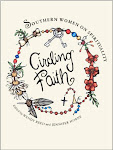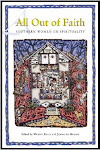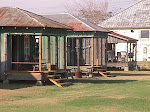“put away all of the Christmas decorations...trying to temper the post Christmas blues....”
Her post elicited a long stream of comments. Some were humorous:
“Wait, I thought it was traditional to keep the tree up until all of the needles fall off on their own. Not everybody does that?”
Others were attempts at chasing away the post Christmas blues:
“keep playing Christmas music and turning on the lights on the tree ’til Jan 6th and see if that helps post Christmas blues!”
“Our tree stays up until after New Year. Seems a shame to cut all the festivities short.”
One or two folks replied with comments about early Church traditions:
“Don't you know there are 12 days of Christmas?”
When the author replied to our encouragements with these words—“Post Christmas blues, for me, have to be fought with a vengeance...I was hoping being Orthodox would change that, but I'm not quite there yet….”—the subject got stuck in my mind, and has stayed there for several days.
At breakfast with a friend yesterday, we talked about the whole Orthodox tradition of fasting and preparing for the feast (Christmas) for 40 days beforehand, and then celebrating for 12 days afterwords—until the Feast of Theophany on January 6. We both agreed that it’s a huge struggle because the Orthodox approach clashes with the culture in which we live.
Our non-Orthodox friends, family, neighbors, and co-workers are celebrating the season all during December, with parties and food and drink and festivities. Our children are enmeshed in this pre-Christmas celebration in their schools. Every shopping mall is filled with shiny decorations and the tempting aromas of chocolates and roasted meats. It’s all so familiar for those of us who grew up with these non-Orthodox traditions, and many converts to Orthodoxy struggle with ambivalence during the Nativity Fast.
One friend told me that she just pretty much gave up on it this year (the Fast) … that it was just too hard to swim against the tide. So her family didn’t focus so much on fasting and didn’t avoid the pre-Christmas parties, but entered into the season with joy. She said that one reason it’s so hard to accept the Orthodox fasting-feasting practice at Christmas is because we really don’t do much “feasting” after Christmas. We deprive ourselves of the festivities going on around us during December and then really only celebrate on one day—Christmas. Often it feels like a let-down after weeks of “preparation,” to cram all the celebrating into one day. Our efforts often leave us with too much of everything: presents, food, drink, and all the stimulation that goes with it. We end up in food comas, exhausted, and yes, often depressed.
I think this was some of what my Facebook friend was expressing. If we’re going to embrace the Orthodox tradition, we need to learn to celebrate the Orthodox SEASON of the Feast of Christmas, with festivities during the 12 days following December 25.
Small parishes that are close-knit and somewhat isolated from the “outside world” probably do a better job of this. And even our parish here in a large metropolitan area offers opportunities, like Christmas caroling at St. Paul Skete the day after Christmas, which is a Feast Day for the Mother of God. And some years we’ve had a mid-week Liturgy with a pizza party following. But somehow those often don’t seem like “enough.” It may take us (converts) many years to adjust to this different rhythm of fasting and feasting.
Another Feast during this season offers an opportunity for celebration, but it

also “clashes” with the secular activities of New Year’s Eve and New Year’s Day. Tonight at St. John we’ll be having Great Vespers for the Circumcision of our Lord and for the Feast Day of Saint Basil the Great (my husband’s patron)—both commemorated on January 1 on the Orthodox calendar. Saint Basil established the first orphanage and the first Christian hospital in the world. We’ll have a potluck at church, and I’ll make the traditional Vasilopita, the “Saint Basil Bread,” in which I’ll hide a gold coin. You can read the story of the tradition here. (Be sure and click on the video of the Greek children singing!)
And I just discovered (too late for this year) that you can actually order a special Saint Basil coin for the bread, here.
You know, I’m a worldly person. I love stuff. I love food and wine and parties and music and all things festive. But I also have a passion for the Church and have struggled for over twenty years with this balance between the “Orthodox way” and the “world’s way.” I’m weary from the struggle, and like my friend expressed at coffee yesterday, I just want it to feel “normal.” But I’m not willing to give up on what the Church in her wisdom is trying to offer me.
This morning I asked God to help me learn to embrace His Feast in the way He intends for me. And then I read the following words, which comprise the quote of the day on the last page (December 31) of the 2009 Daily Lives, Miracles and Wisdom of the Saints Calendar:
“At the approach of a great feast you must watch yourself with particular care. The enemy endeavors beforehand to chill your heart towards the event being celebrated, so that you will not honor it by whole-heartedly considering its reality. He acts upon us through the weather, or through the food and drink we have taken, or through his own arrows thrown plentifully at the heart and inflaming the entire person, at which time evil, impure and blasphemous thoughts occur to us, and we feel thoroughly averse to the solemnity. We must overcome the enemy for forcing ourselves to meditate and pray devoutly.” – St. John of Kronstadt

Finding these words this morning was truly a gift from God. As I approach this, the 7th Day of Christmas, I find myself going around the house singing, happy to still have Christmas decorations up, and joyfully looking forward to making the Vasilopita and bringing it to church tonight. Even the “young folks” who have plans for bringing in the New Year out on the town later are welcome to begin their evening with this beautiful service of Great Vespers first.
And then tomorrow—on the 8th Day of Christmas, the Feast Day of Saint Basil—my

husband and I welcome friends into our home to continue the celebration. And although we won’t be praying and singing church hymns, I think God will bless our time together watching football, eating, drinking, and playing games, because He created us to celebrate, and He is the reason for our joy.
 And I know He will be watching over my daughter, who is on her way to New Orleans for the Sugar Bowl, my son, daughter-in-law and granddaughter in Denver, and my oldest son who is deployed in Afghanastan. Happy New Year’s, Beth, Jason, See, Grace and Jon!
And I know He will be watching over my daughter, who is on her way to New Orleans for the Sugar Bowl, my son, daughter-in-law and granddaughter in Denver, and my oldest son who is deployed in Afghanastan. Happy New Year’s, Beth, Jason, See, Grace and Jon!However your family commemorates the day, I pray you will be safe and full of thankfulness for God’s abundant blessings.
And so I close another year of posts here at Pen and Palette. Thanks so much to all my faithful readers. I'd love t hear your comments on this post!



























































































